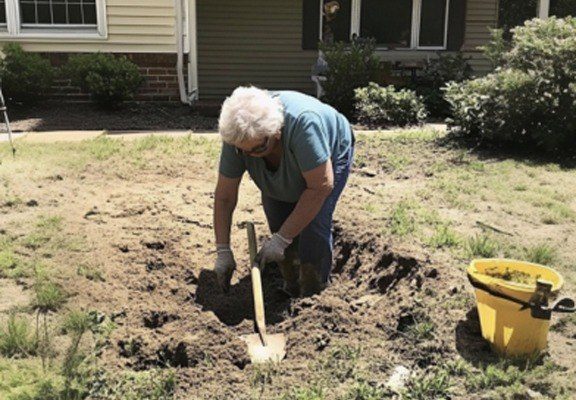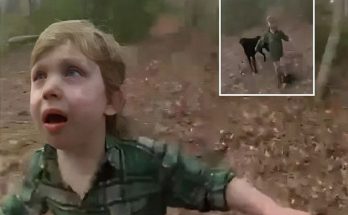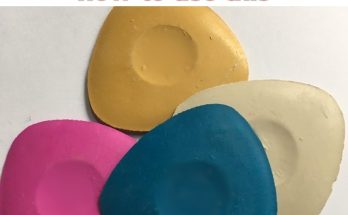ISaw My Neighbor Faint While Digging in Her Yard — I Gasped as I Looked into the Hole She Dug
I hurried to aid my neighbor, Mrs. Cartwright, 67, when she collapsed while digging feverishly in her yard. Finding a hidden wooden box that transformed everything caught me off guard.

I was folding laundry by the window while the sun shone on my peaceful street. My old neighbor, Mrs. Cartwright, was in her yard across the street.
She had a nice grin and was a small woman who usually wore clean cardigans. She had a certain vigor even at sixty-seven, but I was aware that her health was delicate.
She wasn’t the calm person she usually is today. She was excavating. Hard. Sweat stained her blouse as her weak arms poked a shovel into the ground. It didn’t appear correct.
I yelled, “Mrs. Cartwright!” and opened my window. “Are you alright?”
She continued as if she hadn’t heard me, without looking up.
“Do you need help?” I made another, louder attempt.
No response as of yet.

Uneasy, I watched her. Perhaps she was alright? She abruptly halted, dropped the spade, and threw up her hands as I went to draw the window shut.
“Finally!” she said. Then she collapsed to the floor like a puppet whose strings were cut.
“Mrs. Cartwright!” My voice broke. I ran to her yard as soon as I left the house.
With one palm resting on the edge, her slender body was stretched by the hole. I gave her a gentle shoulder shake.
She remained still.
As I checked her pulse, my heart was racing. It was there, but it was dim. I’m grateful. I listened for her breath as I leaned closer. Steady yet shallow and slow. I felt a wave of relief.

I whispered, “Okay, hang on,” not sure whether she could hear.
As I was moving her head to improve ventilation, I saw something. Something wooden peered through the soil in the hole she had been digging. A container?
I paused. The most important thing was to help her. However, the box’s subtle glimmer attracted my attention like a magnet.
“What were you looking for?” I looked from her to the hole and muttered. I was overcome by my curiosity. I dug into the ground and pulled on the box. It was surprisingly easy to loosen.
The lid creaked as I lifted it, and the wood was worn but undamaged. Bundles of letters tied with old string were within. A sealed envelope and yellowed photos were lying beside them.

“What…?” I pulled out one of the photos and my voice trailed off. It featured a smiling young Mrs. Cartwright next to a uniformed guy. Her husband?
Stunned, I gazed. The letters were remarkably well preserved for their age. What sort of tale was concealed here?
A slight moan startled me as I was sorting through the contents.
“Mrs. Cartwright?” I asked, letting go of the picture. She fluttered her eyelids.
“Mm… where…?” She spoke in a hoarse voice.

“You collapsed,” I remarked gently as I knelt down to speak. “Just remain motionless. I’ll make an assistance call.
“No!” Her hand sprang up and surprisingly tightened on my arm. “The container. Is it—” As she struggled to sit up, she coughed.
“It’s here,” I indicated. “But you must take a break. Please.
Eyes wild, she grabbed for the box, ignoring me. “Let me see.”
Then I reluctantly handed it to her. Her brittle fingers grazed the wood as she held it like a treasure.
She muttered, “Sixty years,” as tears streamed down her creased cheeks.
“Sixty years?” I inquired, perplexed.

She said, “My husband,” in a shaky voice. Before going to war, he buried this. claimed that it was a means of protecting his dreams. If he didn’t return, he told me to find it.
Speechless, I blinked.
Further, “He didn’t come back,” she said. “And, my goodness, I looked. But I was unable to locate it. I believed it was lost forever.
Her voice broke. I remained silent so she could talk.
She stated, “But I started dreaming about him again,” with her eyes averted. “‘Under the tree, my dove,’ he said to me. He referred to me by that name. Tears continued to pour, but she chuckled quietly. At first, I didn’t think it was true. “Just a dream,” I said. However, something urged me to dig.
Softly, “And you found it,” I said.
“Because of you,” she said, looking directly into my eyes. “I couldn’t have done it alone.”
I was at a loss for words. Her remarks carried a great deal of weight and emotion.
“What’s in the letters?” At last, I inquired.
She muttered, “Everything,” her hands shaking. “Everything he wanted to say but couldn’t.”
Her fingers brushed the envelope’s seal as she grabbed for it.

“Help me open it,” she replied, her eyes brimming with unsaid appreciation.
She delicately unfolded the delicate paper and took out a note. The exquisite handwriting was lit by the sunlight that streamed through the trees.
“Can I read it?” Gently, I inquired.
She handed it to me and nodded.
After clearing my throat, I started:
“To My Family,

This indicates that my dove has located what I left behind if you are reading it. First of all, know that I loved everyone, even the ones I was unable to meet. We lose sight of the most important things in this fast-paced world. But love—love endures forever. Look out for each other. Even when it’s difficult, forgive. Additionally, avoid becoming strangers because of time or distance.
I’ve left a locket inside this envelope. Ruthie is aware of its significance. As a reminder, keep each other close no matter what life throws at you. What endures is love.
From the bottom of my heart,
Your grandfather and, perhaps, your father.
I glanced at Mrs. Cartwright and lowered the letter. She reached for the envelope, tears running down her face.
Inside, her fingers discovered a little, elaborate locket. When she opened it, a tiny picture of her and her husband appeared, grinning as though they were caught in a picture. In the sun, the locket appeared to shine.
She muttered, “He always said this would outlast us both,” in an emotionally charged tone. “And now, here it is.”
I remarked, “It’s beautiful,”

With a contemplative expression, she flipped the locket in her hands. “You should have this.”
I snapped my head up. “What? That’s… this is for your family, Mrs. Cartwright.
She emphasized, “You’re part of this story now,” in a steady voice that belied the emotion in it. “Robert was a timing man. He thought that things happened to people when they were supposed to. He would probably want you to have it.
Despite my hesitation, I could not deny the sincerity in her gaze. I stretched out slowly and took the locket, which felt almost unexpectedly warm in my hand. I said, “I’ll take care of it,”
She gave a quiet smile. “I know you will.”

Mrs. Cartwright and I sorted through the letters for hours in the days that followed. Each one vividly depicted her husband’s bravery, love, and hope throughout the conflict.
“He wrote about everything,” she related to me one night. “How he longed to return home and how much he missed me. But above all, dad wished for our family to remain close under whatever circumstances.
Her expression showed the weight of those remarks. “Have you thought about sharing these with your family?” I responded.
Her face wavered. “We haven’t spoken much in years,” she acknowledged. “We all drifted away after Robert’s death. There were disagreements… I’m sorry.
I softly remarked, “That doesn’t mean it’s too late,” “This could be a way to bring them together again.”
Though she didn’t answer immediately, the notion appeared to catch on.

Mrs. Cartwright threw a party for her family two weeks later. She required assistance planning it because of her condition, and I was more than willing to help.
Her living room was turned into a cozy, inviting area on the day of the reunion. Together with the photos and the locket, the letters were placed on a table.
There were tentative smiles and uncomfortable greets as her kids and grandkids showed up. However, after everyone had calmed down, Mrs. Cartwright stood up, her weak body miraculously becoming stronger.
“These letters,” she said, her voice clear yet tremulous, “are from your grandfather.” He buried them for us to discover after writing them during the war. They serve as a reminder of what matters most to him.
Picking up a letter, her eldest son started reading. Emotions ran high as his speech filled the room. Some wept quietly, while others grinned despite their tears.
One grandchild stated, “I remember this story,” while displaying a picture. “Grandma told me about this day!”

As her family bonded over the memories, Mrs. Cartwright smiled. As the locket moved around the room, everyone was in awe of the small photograph it contained.
Mrs. Cartwright said, “Grandpa wanted us to pass this down,” while her youngest great-grandchild held the locket. “To remind us to stay close, no matter what.”
The once-distant family members stayed together as the evening wore on, laughing and chatting like old friends. Mrs. Cartwright squeezed my hand, her eyes sparkling with delight.
Softly, “You did this,” she said.
“No,” I answered. “Robert did. as well as you.”
I could see how much the event meant to her, even though she only smiled.

I carried the locket in my palm as I made my way home that evening. Now, its weight seemed different—not heavy, but meaningful—a representation of love and the restored link.
What had begun as a typical day had evolved into something remarkable. I discovered that even the tiniest actions, like lending a hand to a neighbor or hearing a story, had the power to transform lives.

And I knew that her husband’s message would live on, spread by people who loved him, as I looked back at Mrs. Cartwright’s home, which was ablaze with light and laughter.




